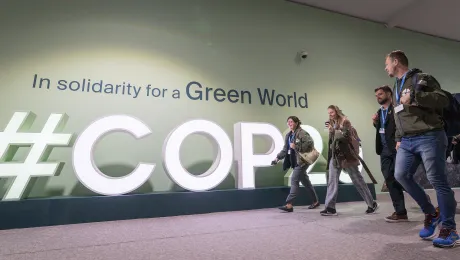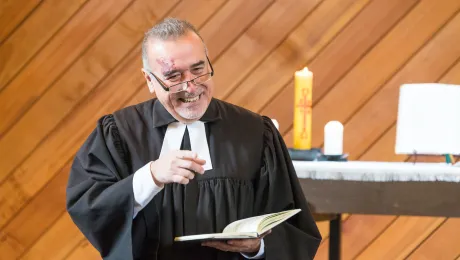
General Secretary of the Chinese Rhenish Church Hong Kong Synod, Mr. Leon Chau in his office in Hong Kong. Photo: CRCHKS
Voices from the Communion: Chinese Rhenish Church General Secretary, Mr. Leon Chau
(LWI) - For 20 years, Mr. Leon Chau, General Secretary of The Chinese Rhenish Church Hong Kong Synod (CRCHKS) has served in several capacities with the Lutheran World Federation (LWF) and found joy in the fellowship and cooperation within and between the communion of churches.
Chau has worked with the Chinese Rhenish Church full-time since 2002. He has held the office of general secretary since 2016 and is the moderator of the Mekong Mission Forum (MMF), a cooperation of Lutheran churches working in the Mekong region. He has also offered his time on several special LWF committees throughout the years.
In this Voices from the Communion interview, Chau speaks about the gift of giving, fellowship with other LWF leaders, the importance of cooperation in missions, and preaching the Gospel under pandemic and political pressures.
In early 2020 you shared with the communion how COVID-19 was affecting your church. What is the situation today?
In the blog, “Keeping Hope Alive” I wrote about adapting to COVID-19 “home stay” orders during the Lunar New Year. Today, 16 percent of the population has been fully vaccinated, but some citizens do not trust the vaccination and are refusing to accept it. This is difficult for the whole society because if we do not vaccinate the majority of the population, we will have the same situation we had a year and a half ago when I wrote the blog.
Government restrictions on the church have relaxed since April 2021 and we can now have 30 percent of the church building capacity gather for religious services. The current regulations also indicated that if 100 percent of a church congregation is vaccinated, we can have up to 50 percent of the church building capacity gather. This is unrealistic because for some people it is not possible to receive the vaccination like small children, for instance. We are expecting a fifth wave of COVID infections in Hong Kong and again, we will have to close the church.
Church policy allows staff to continue working from home but in Hong Kong our living environment is not always favorable for working from home. Our apartments are small, and we do not have adequate space in our apartments with the children schooling from home, as well.
Media shows protest in the streets of Hong Kong. How is the Chinese Rhenish Church continuing to be church in the current climate?
During these difficult times, we join hands with our sisters and brothers in the world who are suffering, and we now enter a different type of solidarity with them as we endure political pressures in Hong Kong.
I also encourage our colleagues, and myself, to continue to preach the Gospel and to preach the truth believing that our Lord will take care of the rest.
What are key church ministries?
We follow the holistic Gospel of telling the good news, helping the poor and educating children in need. It is what we have always done for the last 170 years in China and more than 100 years in Hong Kong.
It may look like we are doing a lot, but we just do a little part together with other churches.
In Hong Kong, most of the social services and education are provided by the churches and then the government sponsors some of those church–run social projects.
Today, we still try to serve the poor through our food bank even though it is quite small scale and helps a small amount of people with food, but it gives beyond the food. One of the workers at this food bank was a recipient of the food bank years ago, and she grew up and came back to work with administration which continues to provide food to others.
What is your personal history with the Chinese Rhenish Church?
In fact, my story is like this woman who returned to help at the food bank.
From kindergarten until secondary school, I studied in the Chinese Rhenish schools with my brother and sisters.
We lived in the same district as the primary school, and it was a 10-minute walk from my home. My parents believed a Christian education was the best. When I was a young student, the schools were practically free for families because there were many poor children in the district.
My parents were not Christian until much later in life when they were baptized into the Christian and Mission Alliance (C&MA) church. My brother became a pastor in another church, my younger sister is a member of my church and is studying for a PhD in New Testament. My eldest sister is a member of the C&MA.
I, on the other hand, became a member of and serve the Chinese Rhenish Church. There are many stories like this among the Lutheran churches in Hong Kong.
Tell us about the Chinese Rhenish Church relationship with other Lutheran churches in the region?
Personally, I am most proud of our work together with LWF among the Mekong countries. One of our main initiatives is in the Mekong Mission Forum.
The Chinese Rhenish Church is a member of the MMF which provides opportunity for holistic mission efforts in Cambodia and other Mekong countries where there are small Lutheran churches with contextual challenges yet are committed to diaconal ministries.
The MMF is comprised of churches in Cambodia, Hong Kong, Laos, Malaysia, Myanmar, Singapore, Thailand and Vietnam, and has partners from Australia, Europe and the United States of America.
We must work together in this area of mission. We cannot settle for how mission work was done in the old days with a dominant mission society that did everything by itself. Today, we work together, in unity to help the younger churches in those countries grow.
The Chinese Rhenish Church focus in the Mekong is Cambodia where there was only one pastor, and we sent a pastor to help them. It is wonderful cooperation and although the Lutheran Church in Cambodia has not yet applied for full membership with the LWF, we are encouraging them and helping them toward membership. It is a process.
What does it mean for your church, your work, you to be a part of the communion of churches?
When we gather to work at LWF meetings, we work for many hours, but after that, we come together for a relaxing fellowship in the evenings. It is a good chance to share with people who are in similar levels of the church. Sometimes, when we hold core positions it becomes difficult to find people in your own church who understand. But during the afterhours of these LWF meetings, we really can go relax, talk to each other, and to share some ideas and possibilities for the church. By LWF providing this time together as a communion of churches, we can create longtime friendships.
By LWF/A.Gray
Video: Mr Leon Chau
The Chinese Rhenish Church Hong Kong Synod was established in 1914 by German missionaries stationed in Hong Kong to learn Chinese. The Rhenish church became Lutheran World Federation members in 1974 and are affiliated with the Hong Kong Lutheran Federation and United Evangelical Mission
The Lutheran World Federation is a global body that shares the work and love of Christ in the world. In this series, we profile church leaders and staff as they discuss topical issues and set out ideas for building peace and justice in the world, ensuring the churches and communion grow in witness and strength.


